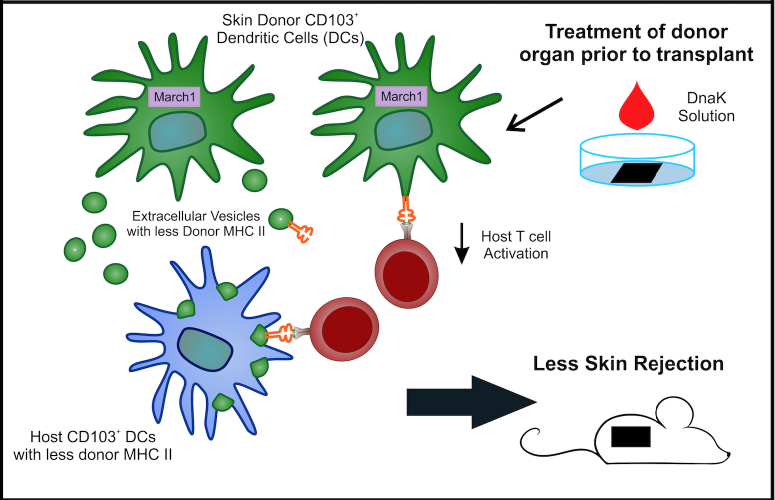Nature Communication 2018
March1-dependent modulation of donor MHC II on CD103+ dendritic cells mitigates alloimmunity
Authors:
Borges TJ, Murakami N, Machado FD, Murshid A, Lang BJ, Lopes RL, Bellan LM, Uehara M, Antunes KH, Perez-Saez MJ, Birrane G, Vianna P, Goncalves JIB, Zanin RF, Azzi J, Abdi R, Ishido S, Shin JS, Souza APD, Calderwood SK, Riella LV, Bonorino C.
In transplantation, donor dendritic cells (do-DCs) initiate the alloimmune response either by direct interaction with host T cells or by transferring intact donor MHC to host DCs. However,
how do-DCs can be targeted for improving allograft survival is still unclear. Here we show CD103+ DCs are the major do-DC subset involved in the acute rejection of murine skin
transplants. In the absence of CD103+ do-DCs, less donor MHC-II is carried to host lymph nodes, fewer allogenic T cells are primed and allograft survival is prolonged. Incubation of
skin grafts with the anti-inflammatory mycobacterial protein DnaK reduces donor MHC-II on CD103+DCs and prolongs graft survival. This effect is mediated through IL-10-induced
March1, which ubiquitinates and decreases MHC-II levels. Importantly, in vitro pre-treatment of human DCs with DnaK reduces their ability to prime alloreactive T cells. Our findings
demonstrate a novel therapeutic approach to dampen alloimmunity by targeting donor MHCII on CD103+DCs.
Nature Communications (2018) 9:3482 | DOI: 10.1038/s41467-018-05572-z
Figure:
Treatment of donor skin prior to transplant reduces MHC expression on donor CD103+ DCs leading to less T cell activation and weaker rejection.

